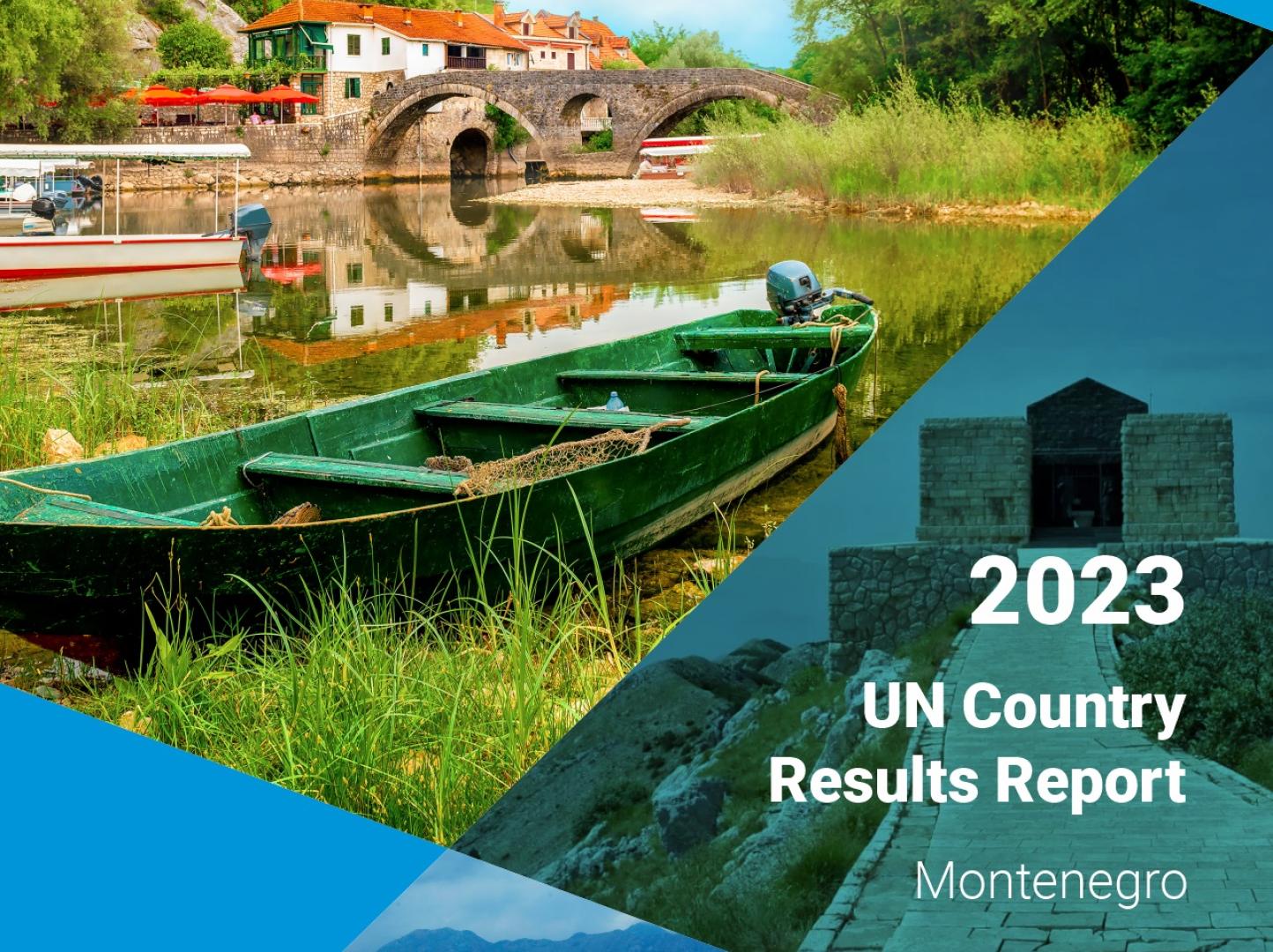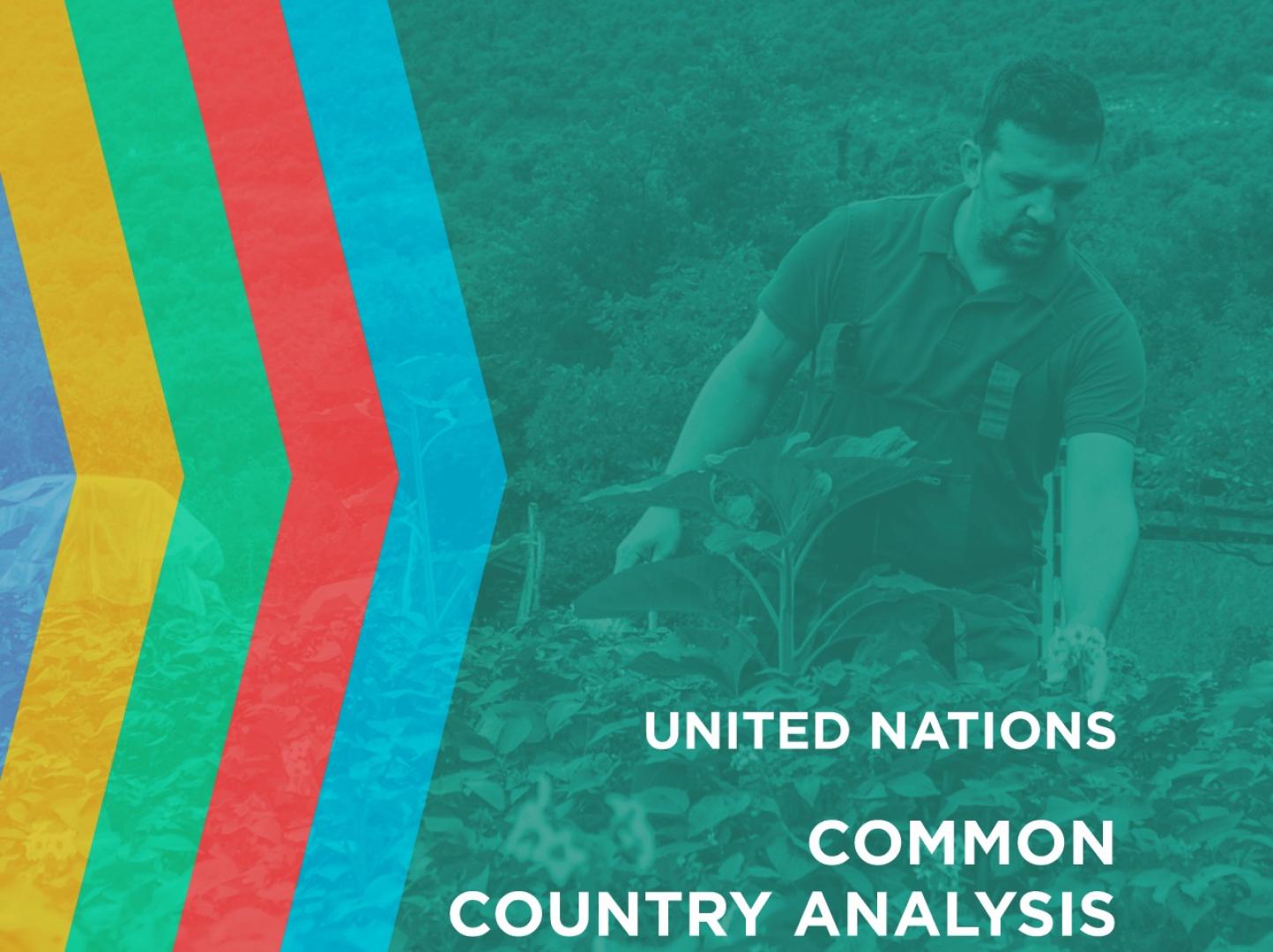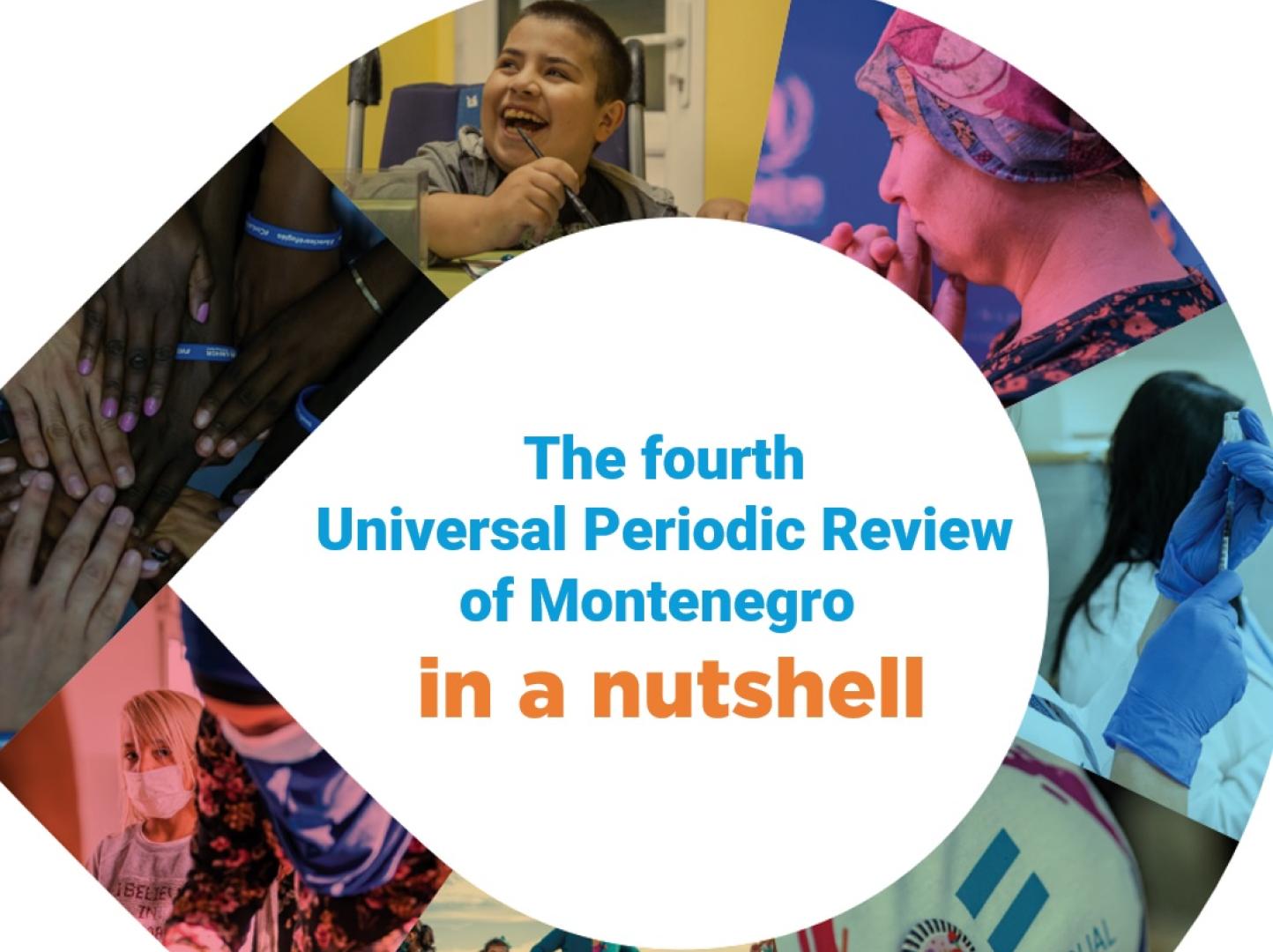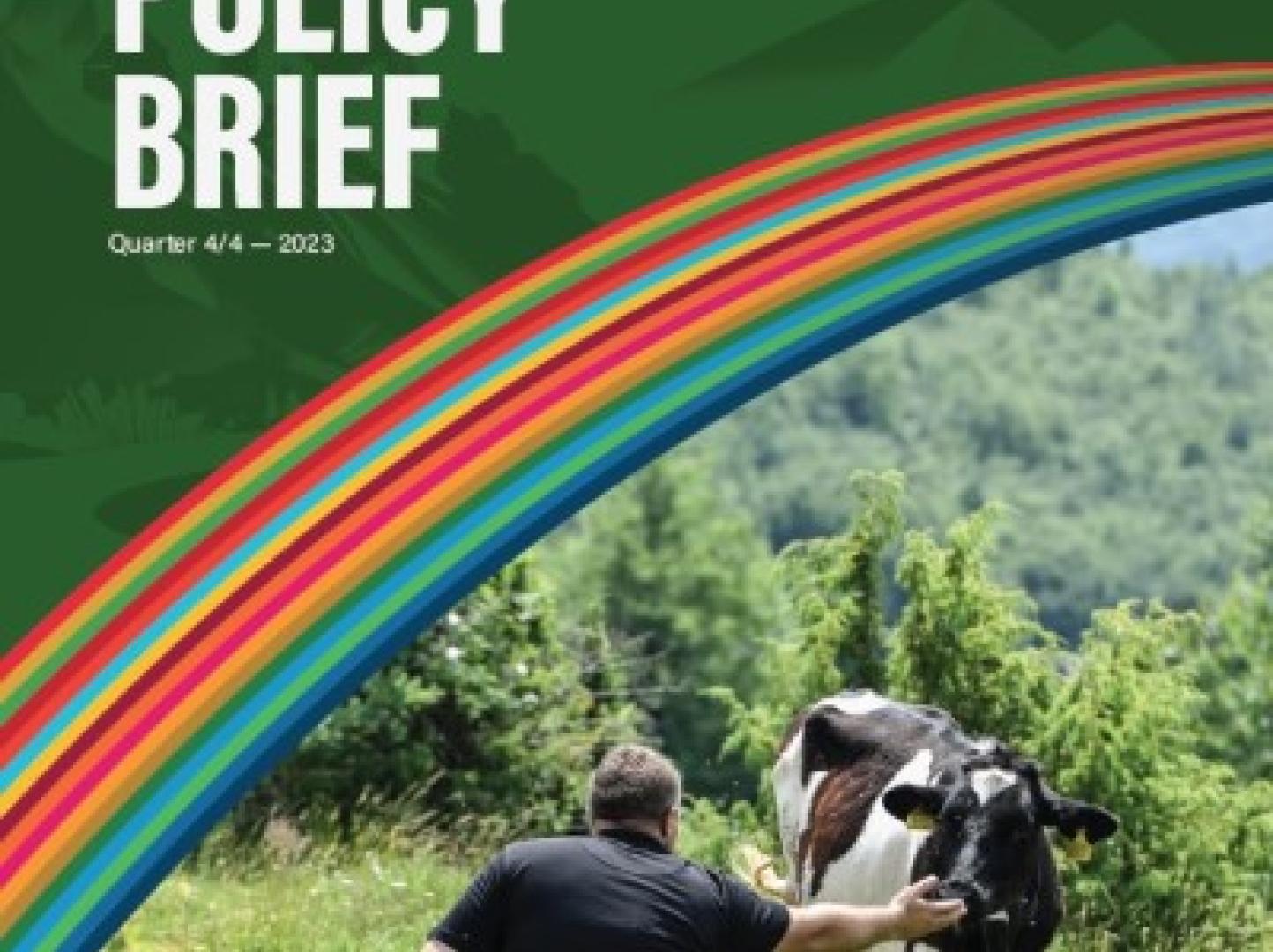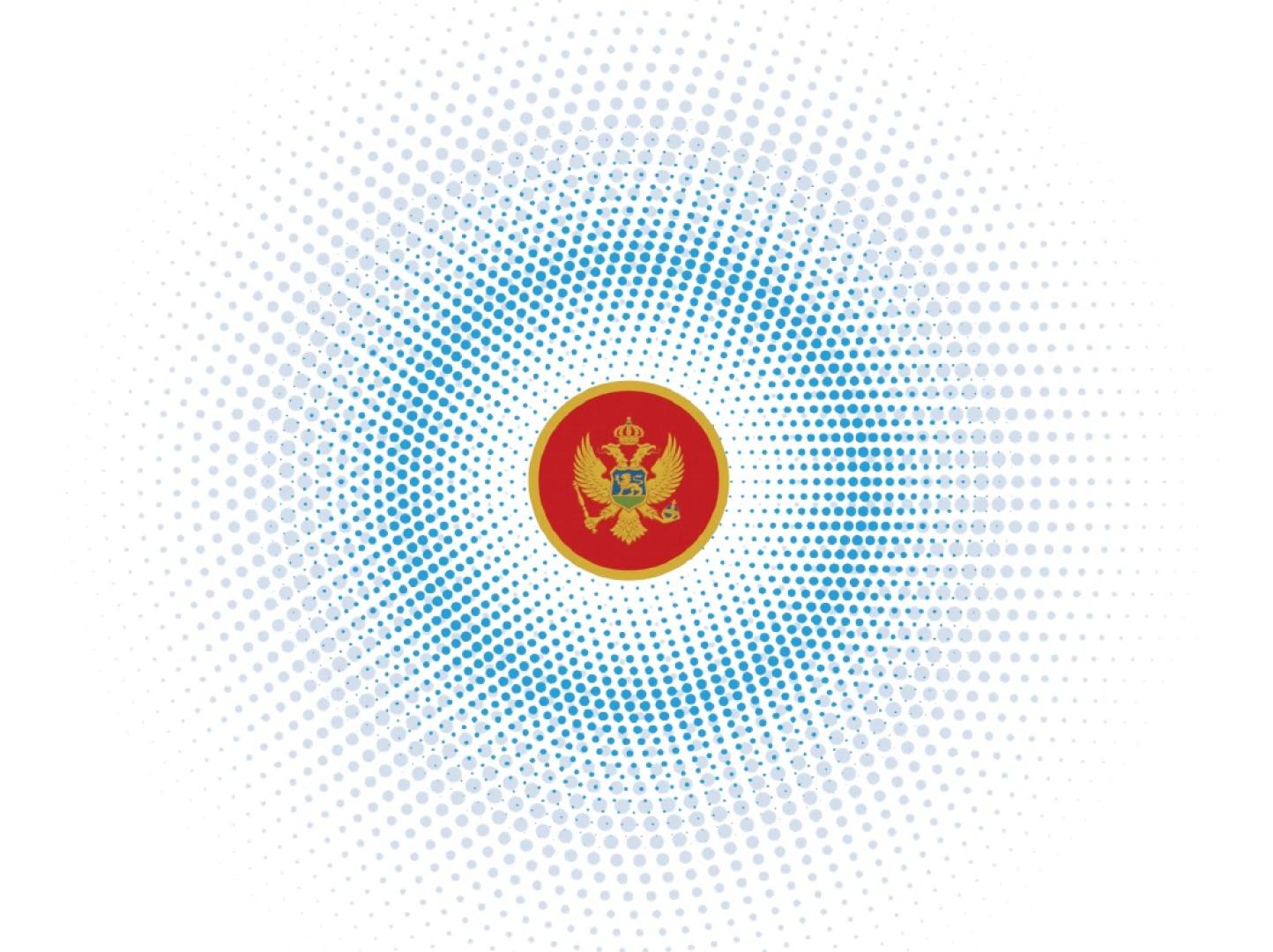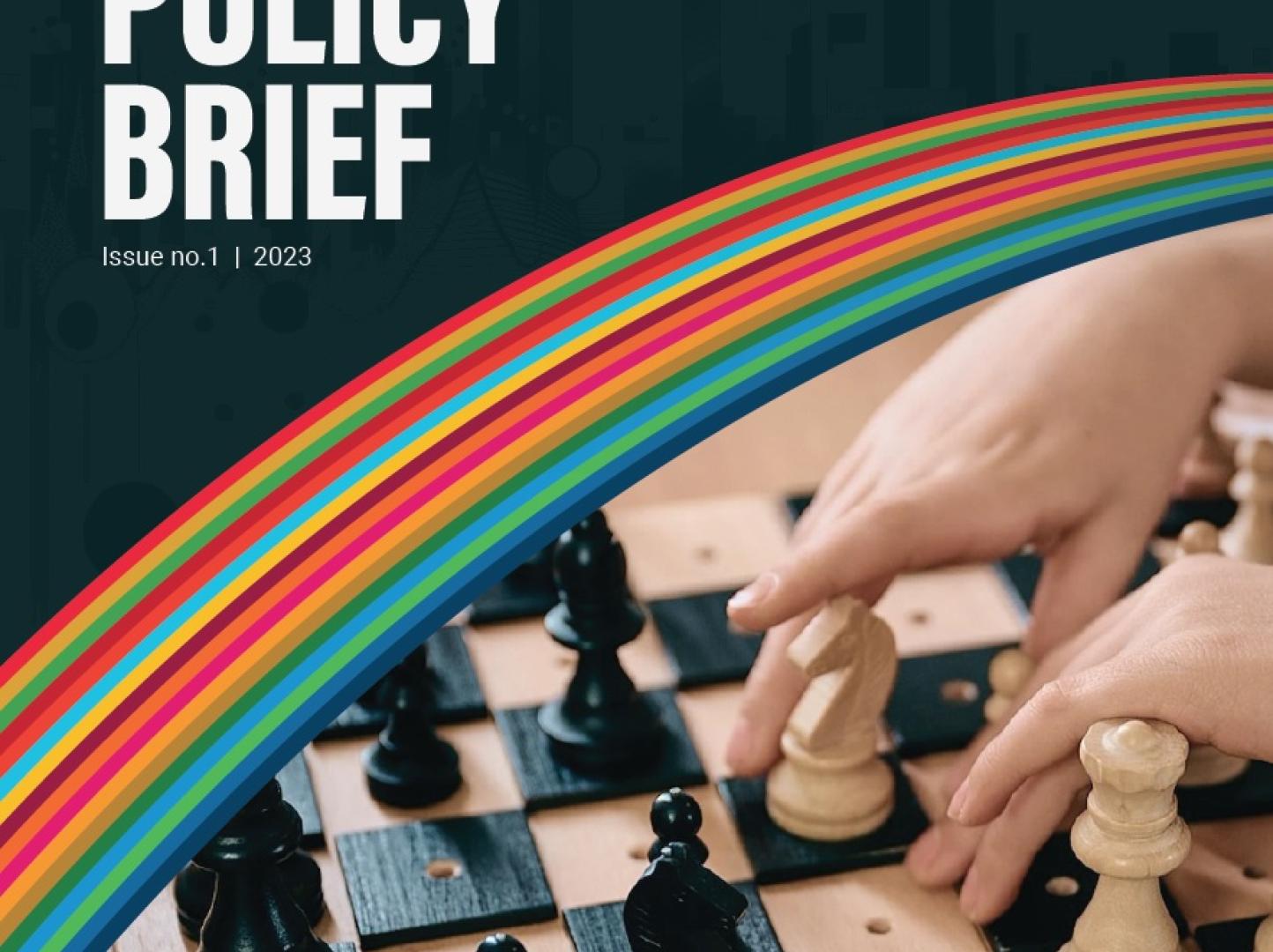Latest
Story
06 February 2026
EU and UN join forces in Pljevlja to support just transition and human-centered development
Learn more
Story
19 December 2025
In Montenegro, women sustain agriculture but hold little land
Learn more
Story
18 December 2025
Regional Policy Dialogue: A moment to pause, reflect, and move forward
Learn more
Latest
The Sustainable Development Goals in Montenegro
The Sustainable Development Goals are a global call to action to end poverty, protect the earth’s environment and climate, and ensure that people everywhere can enjoy peace and prosperity. These are the goals the UN is working on in Montenegro:
Story
01 January 2023
Latest: UN Montenegro Snapshots
Interested in the work of UN team on the ground?You're at the right place. Take a tour below through the review of monthly newsletters - UN Snapshots - where you can find major actions and results the UN team achieved together with partners in Montenegro. Latest... Highlights from UN's work in Montenegro in 2024 Highlights from UN's work in Montenegro in 2023 Highlights from UN's work in Montenegro in 2022 Highlights from UN's work in Montenegro in 2021
1 of 5
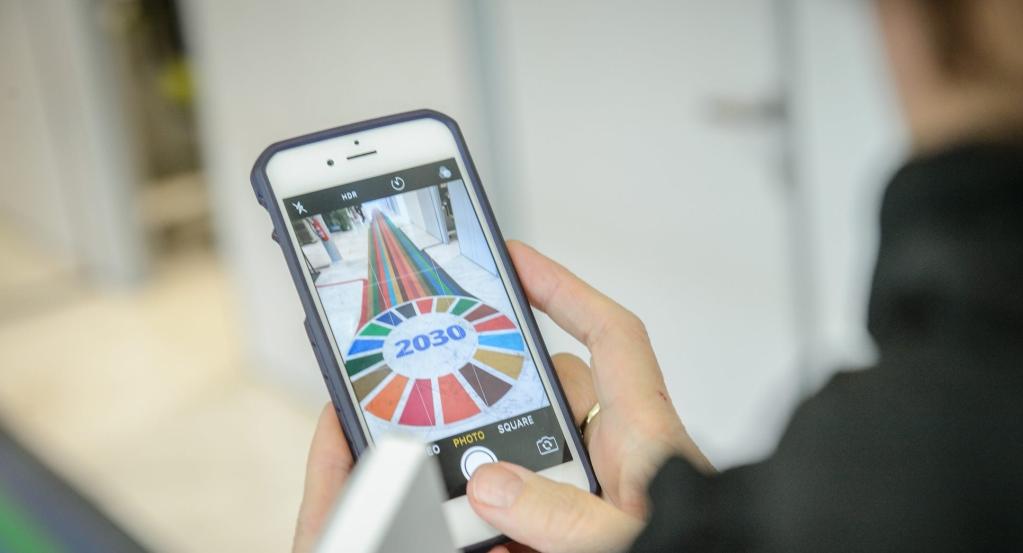
Story
23 October 2023
European Union and Austria signed a partnership within the Montenegro SDG Acceleration Fund
Podgorica, 23 October 2023.High representatives of the Delegation of the European Union, Austria and the United Nations system in Montenegro, in the presence of the President and Prime Minister of Montenegro, signed an agreement on the allocation of funds to the Montenegro SDG Acceleration Fund. The Fund is a new generation financial tool established by the UN team in the country, which seeks to pool donor funds that will be directed towards development initiatives.Click here to donate to Sustainable Development of MontenegroThe President of Montenegro, Jakov Milatović, said that the Fund is not only a financial mechanism, but a powerful means of influence adding that “today's gathering signifies the strength of Montenegro's partnership with the United Nations, the European Union and partner countries.”"Our country has shown its commitment to achieving the Sustainable Development Goals by encouraging this initiative and supporting the implementation of the Strategic Framework of Cooperation agreed by the Government of Montenegro and the United Nations. We have also sent a clear signal that Montenegro is focused on development in strategic areas by making a significant contribution to the Fund and paving a way for other countries to do it." – said Milatović. "With this initiative, we promote the values of the UN, but also generate new value for the citizens of Montenegro. This is the best indicator that a good and inclusive policy pays off and that Montenegro has friends all over the world. We owe a gratitude to the EU, which strongly supports us in this way as well. I invite other countries to join in doing things together, not only for the benefit of Montenegro, but also to send a message of peace and prosperity to everyone, because Montenegro, as an ecological country, is entitled to advocate the Sustainable Development Goals." - said the Prime Minister of Montenegro, Dritan Abazović. The European Union allocated two million EUR for the Montenegro SDG Acceleration Fund, while Austria allocated EUR 1.5 million for this purpose.The Ambassador of the European Union in Montenegro, Oana Kristina Popa, said that support to the Montenegro SDG Acceleration Fund is a new and innovative form of cooperation."We are establishing a unique framework that will allow us access to all 18 UN agencies working in Montenegro. Thus, we will make the best use of their expertise in supporting the necessary reforms and development efforts of Montenegro. Support to the Fund is part of the EU aid package called the Instrument for Reforms, which was created to support Montenegro in solving difficult and structural obstacles to growth, and will include other international organizations, such as the EBRD and the World Bank," said Popa. "Austria is joining this partnership because of its’ unique setup, its transformative and innovative potential. As such, the Fund is aligned with Austrian foreign policy – to support multilateralism through a strong role of the United Nations, and to support the European perspective of the Western Balkans to progress decisively on their path towards joining the EU - also in the interest of regional stability," said Karl Müller, Ambassador of Austria to Montenegro Montenegro SDG Acceleration Fund supports the implementation of the UN Sustainable Development Cooperation Framework 2023-2027, a strategic five-year cooperation plan of the Government of Montenegro and the United Nations. By consolidating and directing funds towards development interventions, this Fund aims to provide strategic support for the acceleration of Montenegro's accession to the European Union and at the same time the implementation of the Agenda for Sustainable Development 2030.UN Resident Coordinator in Montenegro, Peter Lundberg, thanked the European Union and Austria for joining the Fund. "What we are building in Montenegro with this Fund is a precedent in the development system of the United Nations and an inspiration to other countries. We are very proud to present to you today a new platform for donations and the launch of the Fund's partnership with the private sector. The donor platform, as one of the proofs of the Fund's innovative and inclusive approaches, represents an invitation to the private sector, individuals and friends of Montenegro and United Nations to get involved in supporting the sustainable development of the country," said Lundberg, announcing the first partnership of that kind with the Electric Power Company of Montenegro.The latest contributions are continuation of support to the Montenegro SDG Acceleration Fund. Previously, contributions to this Fund were provided by the governments of Luxembourg, Switzerland, Ireland and Montenegro. The Fund is designed to support strategic initiatives in three priority areas of the UN Sustainable Development Cooperation Framework 2023-2027: 1) inclusive economic development and environmental sustainability, 2) human capital development, reducing vulnerability, social inclusion and 3) social cohesion, people-centred governance, rule of law and human rights.
1 of 5
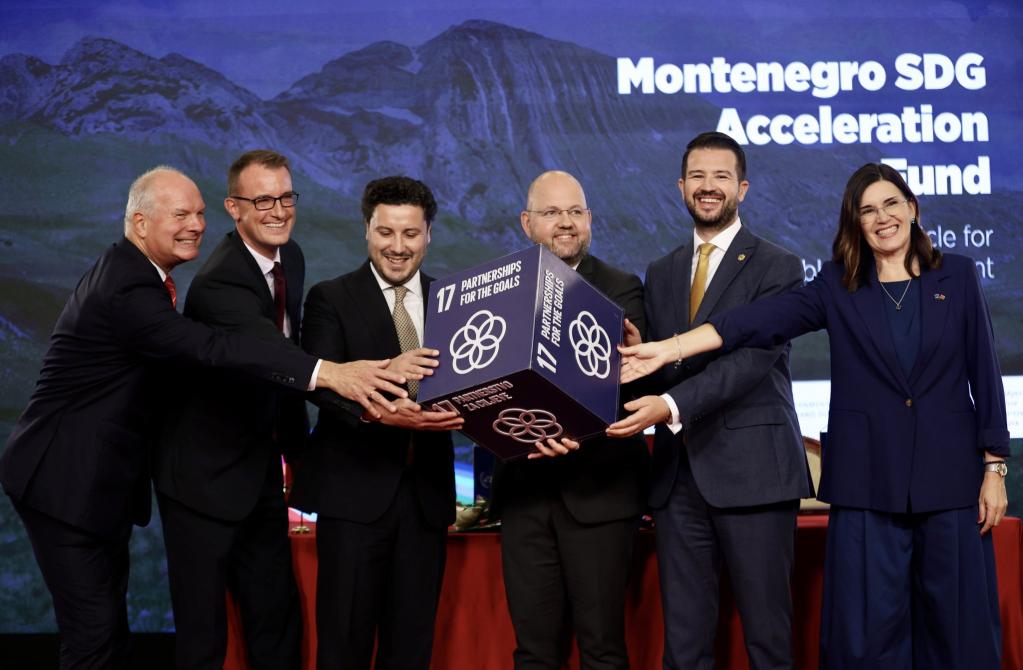
Story
26 September 2023
Montenegro: Failure to ensure judicial independence hindering access to justice, says UN expert
Podgorica, 26 September 2023
The failure to elect the seventh member of the Constitutional Court, the Supreme State Prosecutor and new lay members of the judicial council has put plans for judicial reform at risk in Montenegro, a UN expert said today.
“The failure to ensure the independence and integrity of the judicial system in Montenegro is hindering access to justice for its citizens,” said Margaret Satterthwaite, UN Special Rapporteur on the independence of judges and lawyers in a statement at end of an official visit to the country.
Satterthwaite said Montenegro’s Parliament had failed, on multiple occasions, to elect the seventh member of the Constitutional Court, the Supreme State Prosecutor, and new lay members of the Judicial Council.
“As a result, strategic leadership in these institutions is lacking, and planning and action for reform of the system is not possible. Members of Parliament must put the interests of their country above politics, and ensure these appointments take place without any further delay,” the expert said.
During her visit, Satterthwaite met with judges and prosecutors who reported working in conditions that were manifestly underfunded. Buildings were old, too small, and in a poor state of repair. There was insufficient office space, creating security risks for judges and prosecutors and IT and digitalisation was severely lacking, the Special Rapporteur found.
“During my visits to courts, I was shocked to see and hear about inadequate facilities for storage of archives and evidence, including firearms and drugs,” the expert said.
Satterthwaite said that while various governments had outlined plans for new court buildings over the years, the plans had not resulted in concrete improvements.
She called for additional resources to be provided and decisions on allocation taken with the strictest respect for the principle of judicial and prosecutorial independence.
The Special Rapporteur met many organisations that described being repeatedly excluded, overlooked, or mistreated by the system. Groups representing persons with disabilities, women survivors of intimate partner and family violence, Roma, LGBT persons and others spoke of excessive delays, insensitive or uninformed judges and prosecutors, and a lack of political will to make progress.
Satterthwaite said she recognised the energy and commitment of individuals she met in every part of the judicial system and civil society, who were sincerely working, in good faith, to provide justice and serve their country.
“I salute their efforts and stand ready to offer my assistance and support. I encourage all others in Montenegro and the broader international community to do the same,” the expert said.
She noted that while many of the laws and systems necessary to ensure independence, integrity and quality justice services were now in place in Montenegro, implementation remains deficient.
“If Montenegro cannot, or will not, take steps to ensure the independent, impartial and competent functioning of the judicial system, then a radical accountability measure, such as vetting, must be considered,” Satterthwaite said.
The Special Rapporteur will present a comprehensive report containing her findings and recommendations to the Human Rights Council in Geneva in June 2024.
ENDS
*The expert: Ms. Margaret Satterthwaite, Special Rapporteur on the independence of judges and lawyers. She was appointed as United Nations Special Rapporteur on the independence of judges and lawyers by the Human Rights Council in October 2022. Professor Satterthwaite is an international human rights scholar and practitioner with decades of experience in the field. She is a Professor of Clinical Law at New York University School of Law.
The Experts are part of what is known as the Special Procedures of the Human Rights Council. Special Procedures, the largest body of independent experts in the UN Human Rights system, is the general name of the Council’s independent fact-finding and monitoring mechanisms that address either specific country situations or thematic issues in all parts of the world. Special Procedures experts work on a voluntary basis; they are not UN staff and do not receive a salary for their work. They are independent of any government or organisation and serve in their individual capacity.
UN Human Rights, Country Page - Montenegro
For further information and media requests, please to hrc-sr-independencejl@un.org
For media inquiries regarding other UN independent experts, please contact Maya Derouaz (maya.derouaz@un.org) or Dharisha Indraguptha (dharisha.indraguptha@un.org)
Follow news related to the UN's independent human rights experts on Twitter @UN_SPExperts.
Concerned about the world we live in?
Then STAND UP for someone's rights today.
#Standup4humanrights
and visit the web page at http://www.standup4humanrights.org
Then STAND UP for someone's rights today.
#Standup4humanrights
and visit the web page at http://www.standup4humanrights.org
1 of 5
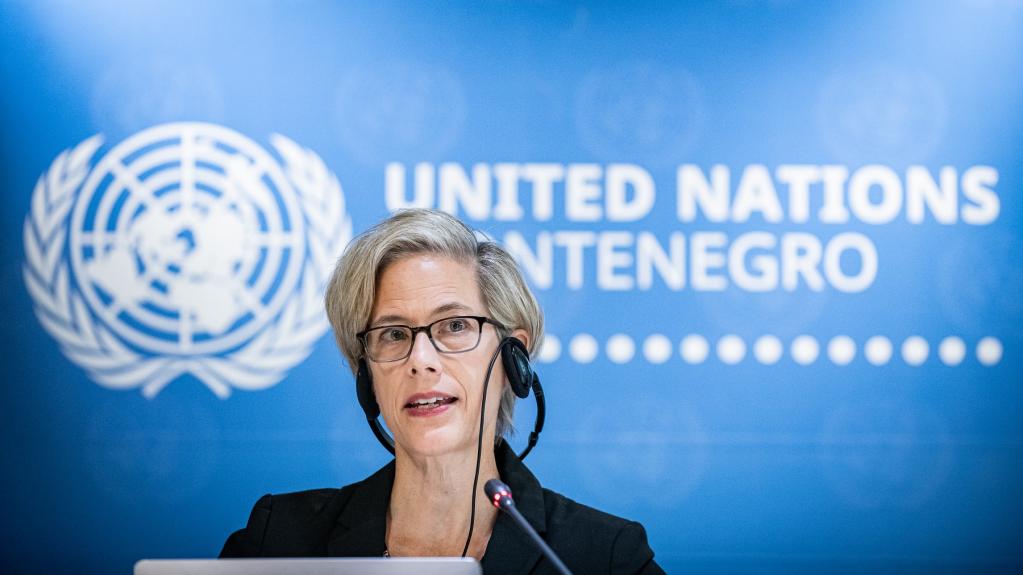
Story
19 June 2023
Words can be weapons. #NoToHate
Podgorica, 19 June 2023
Widespread hate speech among young people, its root causes and consequences were at the centre of a dialogue with young people organized by the UN team in Montenegro organised with drama studio “Prazan prostor (Empty Space)” to mark the International Day for Countering Hate Speech, 18 June, in Podgoric’s Dodest theatre.
The event gathered around 60 young people of different ages, different segments of society, from groups that often face hate speech, and representatives of the Protector for Human Rights and Freedoms and of international partners - the Council of Europe and the Organization for Security and Cooperation in Europe.
“Fighting hate speech is critically important for the UN. It is, as the Secretary-General has said, a toxic and destructive phenomenon. It goes against the very fundamental promises of the Universal Declaration of Human Rights, whose 75th anniversary we commemorate this year, and which remains as relevant today as it was then,” said Anjet Lanting, Human Rights Adviser in the UN team in Montenegro.
In a dynamic and open discussion, young people agreed that hate speech is omnipresent in their communities, pointing out that the response of society is not nearly sufficient.
The dialogue saw an exchange of experiences, touching testimonies, and concrete examples faced by young people, who identified some of the root causes and key drivers of hate speech. Patriarchal stereotypes, unregulated social media and the lack of prioritizing this problem were just some of the causes mentioned in discussion.
“Hate speech is used at every step and every day, on any possible ground – gender, sexual orientation, nationality, political affiliation, wealth status, popularity in the group… all of these,” said 17-years old Asmir, pointing that at times people justify hate speech by referring to the freedom of speech.
The dialogue with young people was inspired by young actors’ short performances of real-life situations and the short movie “Love and Violence”. The movie depicts a play by young actors of real-life situations and of gender-based hate speech and violence experienced by adolescents. The play is performed in the so-called ‘forum theatre’ – an interactive format with interruptions by moderators at critical moments to engage the audience in discussion.
“What we saw in the movie is very realistic, something that we witness or experience almost on daily basis,” said 12-year-old Iva, noting that hate speech is too often ignored or covered up.
Facilitators from drama studio “Prazan prostor” Marija and Mirko, who have vast experience in facilitating dialogues on this topic, steered the discussion towards helping the young audience to understand the nature of hate speech and to getting them to share their views.
“It’s always fascinating but at the same time shocking when young people unlock their experiences and their attitudes,” said Marija emphasizing that society has an unacceptable level of tolerance towards hate speech and that hate speech these days seems to have become normalized.
“What we heard today is hard hitting, uncomfortable, but it was clear: hate speech and violence in the home, in schools, in media and in society are very real. Young people shared touching experiences, but also important ideas of what they can and will do themselves, and what parents, teachers and leaders should do to stop hate speech and violence,” concluded Anjet Lanting.
The dialogue with young people on hate speech was organized within the initiative to mark the 75th anniversary of Universal Human Rights Declaration - #HR75. The UN Human Rights Office funded the event.
Photo Gallery
1 of 5
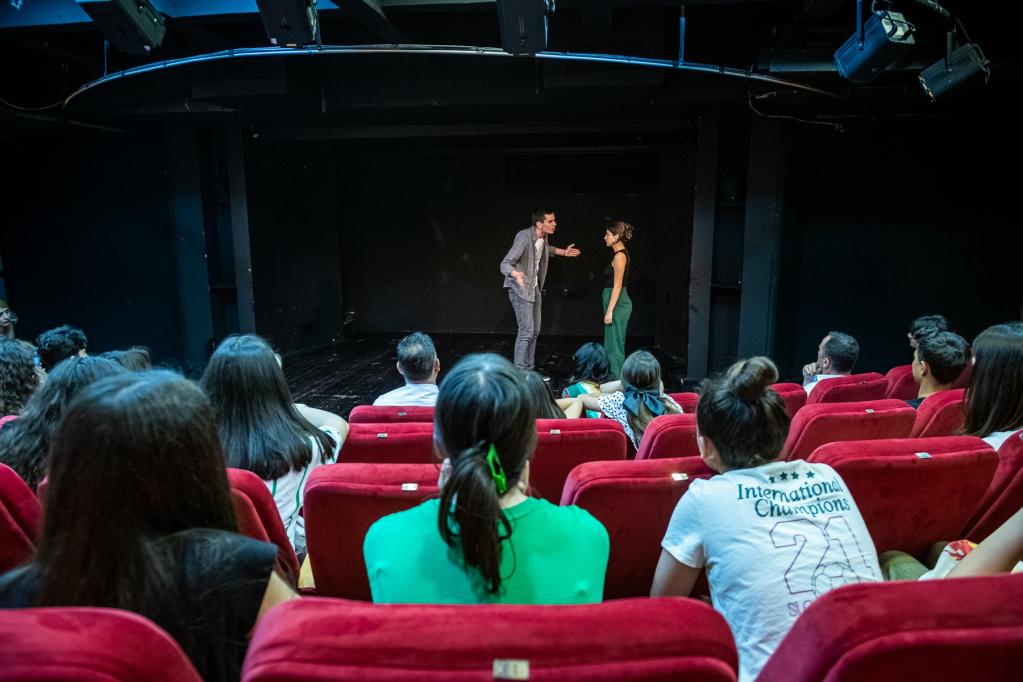
Publication
01 July 2022
United Nations Sustainable Development Cooperation Framework Montenegro 2023-2027
Responding to national priorities, the UNSDCF 2023-2027 was developed as a joint commitment by the United Nations Country Team (UNCT) to accelerate progress towards the 2030 agenda and EU accession.
1 of 5
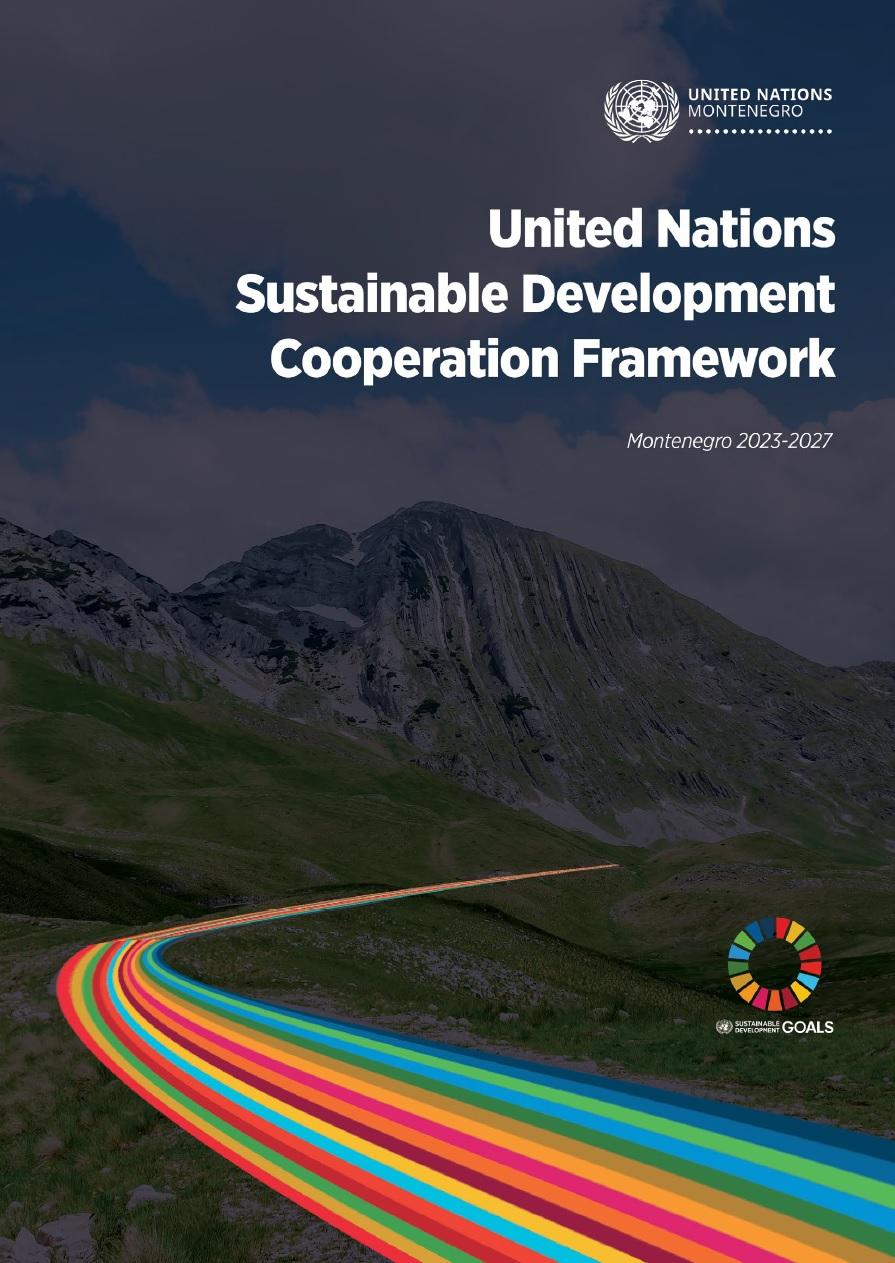
Story
06 February 2026
EU and UN join forces in Pljevlja to support just transition and human-centered development
6 February 2026 – Pljevlja, Montenegro UN resident coordinator, Caroline Tissot, and Johan Sattler, EU Ambassador, led a joint visit to Plevlja, accompanied by the UNDP, WHO and European Investment Bank representatives. This visit underscored the strong partnership between the EU and the UN and explored how to jointly support a just transition and human-centered development, as Montenegro advances on its path toward EU accession and the achievement of the Sustainable Development Goals. The delegation met local authorities, energy sector representatives, social partners, and civil society, to hear their perspectives and exchange on how joint action can help Pljevlja navigate the transition toward a more sustainable, inclusive, and resilient future, ensuring that no one and no community is left behind.Energy transition at the center of dialogueAs part of the visit, the joint delegation toured key energy and environmental infrastructure in Pljevlja, including the Thermal Power Plant, the Coal Mine, and the Wastewater Treatment Plant. The on-site exchanges offered first-hand insight into ongoing efforts to modernize Montenegro’s energy sector while addressing environmental concerns and safeguarding livelihoods. The programme included a meeting with the Minister of Energy and Mining, Admir Šahmanović, representatives of the national energy company EPCG, and local authorities, including the Mayor of Pljevlja. Discussions focused on aligning energy transition efforts with EU accession priorities, environmental protection and socio-economic development.Minister Šahmanović emphasized that Pljevlja has long been a cornerstone of Montenegro’s energy system and that the transition must be carefully planned and socially responsible.“Through concrete and effective cooperation among all institutions, international partners, and the local community, we can carry out a just transition while creating new opportunities for Pljevlja and its residents,” Šahmanović said.The EU Ambassador Johan Sattler underlined the European Union’s commitment to supporting all regions of Montenegro on their EU path.“No municipality should be left behind. The EU stands ready to support a just transition, drawing on the experience of its Member States and growing interest from investors in renewable energy and innovative technologies,” Ambassador Sattler noted. The mission continued with a visit to the EU‑supported wastewater treatment plant, which highlighted the importance of integrated, risk‑based water management and demonstrated how Pljevlja can advance health‑focused solutions by linking water safety planning, and wastewater management.Putting people at the center of transitionImportant part of the joint visit was engagement with local civil society organizations and social partners, including the Employment Agency of Montenegro, the Union of Employers, and trade union representatives in Pljevlja. These exchanges focused on employment, skills development, social protection, and the importance of inclusive dialogue in shaping a transition that works for workers, families and future generations.The UN Resident Coordinator Carolin Tissot stressed that the transition must go beyond infrastructure and technology, placing people and communities at its heart.“This joint visit confirms our commitment to supporting Pljevlja in a just transition that puts people at the center. By aligning environmental responsibility with economic resilience, Montenegro is advancing the Sustainable Development Goals and moving closer to EU membership,” Tissot said. Strong partnerships for a sustainable futureThe visit demonstrated the breadth of international support for Montenegro’s just transition, reflecting strong alignment between European Union and United Nations around shared priorities for sustainable development.By bringing together EU and UN around a common vision for Pljevlja, the joint engagement reaffirmed that through coordinated action, inclusive dialogue and long-term investment, the energy transition can become a catalyst for sustainable economic development, improved health outcomes, and decent work. Grounded in partnership with national and local actors, this approach can help ensure that the transition delivers tangible benefits for communities in Pljevlja and contributes to Montenegro’s progress on EU accession and the Sustainable Development Goals.
1 of 5

Story
19 December 2025
In Montenegro, women sustain agriculture but hold little land
Women in Montenegro perform much of the country’s agricultural work yet remain largely excluded from land ownership and decision-making. They make up more than half of the workforce on family farms but just 12.9 percent of those who hold ownership or secure rights to agricultural land.This is according to the new National Gender Profile of Agriculture and Rural Livelihoods, developed by the Food and Agriculture Organization (FAO) in close partnership with the Government of Montenegro.“Without addressing persistent gender disparities, it will not be possible to achieve better food security, improve nutrition, reduce poverty, or build resilience to climate change,” said Nabil Gangi, FAO Deputy Regional Representative for Europe and Central Asia and FAO Representative in Montenegro. "This assessment sheds light on the vital but often invisible contributions of women to rural development and outlines key directions for ensuring that rural women both benefit from and contribute to agrifood systems transformation,” Ganghi said.Unequal rural realitiesDrawing on data from the country’s first agricultural census in 14 years, the report shows that women’s work in agriculture in Montenegro is often unpaid and undervalued, even though it is central to food production and household well-being.Gender inequalities are most pronounced in the northern region, where around 60 percent of residents live in rural areas. Agriculture remains the backbone of local livelihoods, but poverty levels there are almost three times higher than in other parts of the country. Women face limited access to education, health care and employment and spend long hours balancing farm work with domestic and care responsibilities, leaving little time for training or entrepreneurship.At the national level, Montenegro has made progress on gender equality, with its Gender Equality Index improving from 55.0 in 2019 to 59.3 in 2023 (out of a possible 100). However, the country remains behind the European Union average. The widest gaps persist in access to financial resources and participation in decision-making, two factors that strongly influence women’s ability to invest in and shape agrifood systems.Signs of progressDespite these challenges, gradual change is under way. Women now head around 16 percent of registered family farms, and under the 2025 Agrobudget they are entitled to 10 percent additional funding in selected investment areas such as crop and dairy production.Women’s entrepreneurship is also expanding. About one in four micro, small and medium-sized enterprises in Montenegro is owned by women, although many rural businesses remain informal. Women who took part in the Country Gender Assessment’s focus group discussions expressed strong interest in developing business, digital and marketing skills, alongside improved access to start-up capital and professional networks.Land ownership and decision-making remain unequalDespite these signs of progress, however, deep-rooted inequalities persist in land ownership and leadership. While the country’s legal framework guarantees equal property rights for women and men, cultural norms continue to favour male inheritance. Many women still renounce property in favour of male relatives, limiting their access to collateral and finance.Much of the rural economy in Montenegro depends on women’s unpaid work on family farms, yet this effort seldom appears in statistics or policymaking. The assessment urges improved sex-disaggregated data to capture women’s full contribution to rural life and the economy.Empowered women, transforming agrifood systemsMontenegro has made important progress in aligning its policies with European Union standards and with the Convention on the Elimination of All Forms of Discrimination against Women (CEDAW) and the 2030 Agenda for Sustainable Development. Still, many sectoral strategies remain gender blind, lacking the practical measures, targets and resources needed to translate legal commitments into action.“Together with United Nations agencies, development partners and other stakeholders, FAO will continue to provide technical expertise and support to the Government of Montenegro in order to address systemic barriers for empowering rural women, in alignment with national priorities and international commitments,” Gangi said.The Country Gender Assessment offers a framework for integrating gender perspectives across agriculture, rural development and climate adaptation while expanding women’s access to resources, finance and leadership roles.
As the 2026 International Year of the Woman Farmer approaches, the findings highlight the need for policies and investments to ensure that rural women have equal access to land, finance and decision-making in agrifood systems.
As the 2026 International Year of the Woman Farmer approaches, the findings highlight the need for policies and investments to ensure that rural women have equal access to land, finance and decision-making in agrifood systems.
1 of 5

Story
18 December 2025
Regional Policy Dialogue: A moment to pause, reflect, and move forward
Agrifood systems transformation in the Western BalkansAs the year was ending, Montenegro found itself at a rare crossroads. With key European Union (EU) negotiation chapters closed, formal milestones have been reached and a demanding reform cycle completed. Still, the larger question remained, how to ensure that this progress translates into lasting change for people, communities and ecosystems.It was against this backdrop that policymakers, experts, practitioners, as well as representatives of the United Nations (UN) from across the Western Balkans gathered in Podgorica for the Regional Policy Dialogue on accelerating sustainable, inclusive and resilient agrifood systems. Convened with the support of the Food and Agriculture Organization of the United Nations (FAO), the dialogue was part of broader regional efforts to strengthen policies and partnerships shaping the future of agrifood systems. More than an event, the dialogue created space for reflection on what has been achieved, what remains fragile, and what must come next if the region is to truly demonstrate its readiness for the opportunities and responsibilities of European integration.Food and agriculture at heart of the dialogueFrom the outset, the conversation moved beyond agriculture as a single sector. Agrifood systems were discussed as living systems shaped by climate change, environmental pressures, market volatility, demographic trends and social inequalities. Montenegro’s Minister of Agriculture, Forestry and Water Management, Vladimir Joković emphasized that transformation cannot be rushed, nor achieved through isolated interventions. It requires strong institutions, long-term vision and partnerships that extend across government, communities and regions.Minister of European Affairs Maida Gorčević added another layer to the discussion, framing EU integration not as an endpoint, but as a framework for continuous reform. Aligning policies with European standards opens access to markets, investments and funding but also demands the capacity to absorb those opportunities responsibly, with farmers, rural communities and vulnerable groups at the center.The dialogue gained depth through regional perspectives that reflected both shared challenges and diverse pathways. From Serbia, Tatjana Brankov, Special Advisor to the Minister at the Ministry of Agriculture, Forestry and Water Management of the Republic of Serbia, spoke of a global food system under strain one that places growing pressure on the environment, public health and social justice. In this context, she stressed that transforming agrifood systems is no longer a political choice, but a global necessity. Serbia’s experience with biodistricts illustrated how this transformation can take shape on the ground, linking sustainable production, local value chains, nature protection and rural development within a single territorial model.North Macedonia’s contribution, shared by Neda Gruevska, Head of Department for International Cooperation at the Ministry of Agriculture, Forestry and Water Economy of North Macedonia, reinforced the message that modernization must go hand-in-hand with nature. Investments in knowledge, innovation, digital agriculture and practices that protect soil, water and biodiversity were presented not as optional add-ons, but as foundations of long-term food security particularly for smaller countries where smart, targeted support can yield outsized results.Throughout the dialogue, one theme consistently resurfaced: integration. Policies, data, financing and governance must work together if agrifood systems are to become more resilient and inclusive. As Deputy Regional Representative of the Food and Agriculture Organization of the United Nations (FAO) for Europe and Central Asia, Nabil Gangi noted, no single challenge can be addressed in isolation, be it climate, nutrition or economic resilience. Transformation requires a systemic approach, grounded in evidence and sustained through cross-sectoral collaboration.The presence of the United Nations system reinforced this perspective. UN Resident Coordinator in Montenegro, Caroline Tissot, highlighted that agrifood systems transformation is as much a societal challenge as it is an agricultural one, calling for closer linkages of food, health, environment, trade and social inclusion agendas.Rather than concluding with declarations, the dialogue left participants with a shared sense of responsibility. Closing negotiation chapters and adopting strategies are important achievements, but they are not guarantees of success. The real test lies in maintaining momentum, strengthening coordination across institutions and borders, and ensuring that reforms deliver tangible benefits for people and places.In this way, the Regional Policy Dialogue in Podgorica marked a meaningful pause at the end of the year, not a moment of closure, but of renewed commitment. A reminder that progress must be continuously achieved, and that the transformation of agrifood systems in the Western Balkans will depend on the region’s ability to work together, learn from one another and turn opportunity into lasting change.
1 of 5

Story
15 December 2025
Protecting Civil Society: Safe Participation to Advance Human Rights
Podgorica, 15 December 2025The role of civil society in advancing human rights, and the need for its stronger protection and empowerment, was at the heart of an event organized by the United Nations team in Montenegro to mark Human Rights Day 2025. The event, titled “Protecting Civil Society: Safe Participation to Advance Human Rights,” brought together representatives of the Government, state institutions, civil society organizations, human rights defenders, and members of the international community.Opening the event, Minister of Human and Minority Rights Fatmir Gjeka emphasized that protecting civil society and ensuring its safe participation in public life are not only Montenegro’s international obligations, but a fundamental prerequisite for building a society in which human rights are upheld in practice, not only on paper.“Montenegro must build a system in which critical voices are valued rather than suppressed, where partnerships with civil society are developed rather than simulated, and where institutions strengthen public trust through transparency and accountability,” Minister Gjeka said. UN Resident Coordinator in Montenegro, Caroline Tissot, highlighted the direct impact of civil society on people’s lives and on the country’s democratic development.“There is no true democracy without an inclusive and safe civil society. The role of civil society and human rights defenders is essential to making human rights a reality for every person,” said Tissot, reaffirming that the United Nations remains a strong partner in promoting and protecting civic activism. Drama Studio presented a provocative performance illustrating contrasts between official interpretations of human rights and real-life situations. The performance highlighted various forms of human rights violations, including gender inequality, LGBTI rights violations, and violence against women and children. Protector of Human Rights and Freedoms, Siniša Bjeković, stressed the importance of close cooperation between institutions and civil society.“Civil society is, and must be, a strategic partner of the institution of the Protector of Human Rights and Freedoms. The success of our institution is to a great extent the result of the cooperation with civil society organizations,” Bjeković noted. Speaking on behalf of the European Union Delegation to Montenegro, Friederike Wünschmann, Human Rights and Rule of Law Policy Officer, underlined that, while Montenegro benefits from a dynamic civil society, the environment in which civil society organizations operate remains sensitive.“Safeguarding civic space means ensuring genuine participation in policymaking, transparent public funding, and protection from intimidation and undue pressure,” Wünschmann emphasized.The programme featured two panel discussions. The first panel named “Civil society participation in public life” examined existing mechanisms and challenges related to the involvement of civil society organizations in policymaking and public decision-making processes. The discussion highlighted perspectives, experiences and recommendations of panellists Ernad Suljević, Minister for Regional Investment Development & Cooperation, Petar Knežević from the NGO Centre for the Development of Non-Governmental Organizations, Director of the Centre for Children’s Rights Jelena Gluščević, Dragana Božović from the NGO Nova žena and Vladimir Perazić from the NGO National Youth Network. The second panel, “Safe space for civil society,” focused on security, freedom of action, and the protection of human rights defenders, as well as the responsibility of institutions to ensure an enabling environment for civil society to operate. This panel featured an exchange of views, good practices and recommendations by Siniša Bjeković, Protector of Human Rights and Freedoms, Tea Gorjanc Prelević from the NGO Human Rights Action, environmental activist Vuk Vujisić, Radomir Kračković of Montenegro's Media Union and Anjet Lanting, UN Human Rights Adviser. Through dialogue, exchange of experiences, and the presentation of good practices, participants explored opportunities to further strengthen cooperation between institutions and civil society, while also gaining deeper insight into the current state of civil society in Montenegro. Particular attention was given to recommendations issued by UN human rights mechanisms. In March 2025, the UN Human Rights Committee recommended that Montenegro investigate attacks against civil society organizations and strengthen public participation mechanisms. These recommendations build on the conclusions of the Committee on the Elimination of Discrimination against Women (CEDAW) from 2024, as well as recommendations made by UN Member States during Montenegro’s Universal Periodic Review in 2023.Human Rights Day is observed annually on 10 December, marking the adoption of the Universal Declaration of Human Rights by the UN General Assembly in 1948, a landmark document that laid the foundation for the modern international human rights system worldwide. Photo Gallery
1 of 5

Story
25 November 2025
Every woman and girl should live free from violence – in every home, workplace, school, and in the digital space
25 November 2025Violence against women and girls, online and offline, is one of the most pervasive human rights violations of our time. It affects communities everywhere. In Europe, nearly 2,300 women and girls were murdered by an intimate partner or family member in 2023. A stark 37 million women were raped or sexually assaulted during childhood[1]. In Montenegro, one in three women has experienced sexual harassment since the age of 15[2].The impact of violence extends far beyond the individual. It weakens families, divides societies, and hinders progress. The scale of the problem demands urgent, united action. “Violence against women and girls is not inevitable. It can and must be prevented,” says Caroline Tissot, UN Resident Coordinator in Montenegro. “Ending violence against women and girls requires courage, commitment, and collaboration from everyone in society – from government institutions and justice systems to schools, tech companies, and communities," said Tissot. "Together, we can make Montenegro a place where women and girls are safe, respected, and empowered – everywhere, every day,” Tissot concluded.This year’s 16 Days of Activism Against Gender-Based Violence campaign calls for stronger laws, better data, and a whole-of-society response to end violence in all its forms – online and offline.Jointly, we need to ensure that stronger laws will mean stronger accountability, that justice systems are survivor-centred. We need better data to understand the scope and causes of gender-based violence. Through education and culture, we must challenge harmful norms, prejudices, victim-blaming, and engage men and boys as allies. We have a duty to make sure that all women and girls – especially those most at risk, including women with disabilities, Roma and Egyptian women, LGBTQ+ women, and migrants – are fully protected and supported.Ending violence against women and girls is everyone’s responsibility. The UN calls on:- Government – to allocate sufficient funding, strictly enforce laws, invest in comprehensive prevention strategies and develop prevention and protection services, including crisis centres and child-friendly models such as Barnahus.- Institutions – to invest in social services, legal and law enforcement professionals, health and education workers, and specialized cybercrime units to prevent and respond swiftly to violence against women and girls. Strengthening these services ensures better justice, protection, and safe reporting channels for survivors.- Tech companies – to ensure safety and accountability on their digital platforms.- Men and boys – to stand up as allies, learning from an early age about healthy relationships and challenging harmful social norms.Zero tolerance means zero excuses. Only by working together can we create a future where every woman and girl lives free from violence.
[1] Adolescence in Europe Policy Brief.pdf[2] Well-being and safety of women - OSCE
[1] Adolescence in Europe Policy Brief.pdf[2] Well-being and safety of women - OSCE
1 of 5

Press Release
18 September 2023
UN expert to visit Montenegro to assess the independence of justice system
GENEVA (18 September 2023) – The UN Special Rapporteur on the independence of judges and lawyers, Margaret Satterthwaite, will conduct her first official visit to Montenegro from 19 to 26 September 2023.
During her visit, Satterthwaite will assess the measures taken by the Government to ensure the independence of the judiciary and the free exercise of the legal profession. She will examine the ongoing reform process of the judiciary to assess its compliance with international human rights standards, such as the independence of the judiciary and the principle of separation of powers. She will also examine the issue of access to justice for all, seeking to understand the way ordinary people in Montenegro experience the judicial system.
The expert will meet Government officials and members of the Parliament, judges, prosecutors and lawyers. She will also meet representatives of civil society, academia, UN agencies, donors and the diplomatic community.
Satterthwaite will hold a press conference on Tuesday 26 September at 10:30 local time at the UN Eco House. Access is strictly limited to journalists.
The Special Rapporteur will present her report to the Human Rights Council in June 2024.
ENDS
*The expert: Ms. Margaret Satterthwaite, Special Rapporteur on the independence of judges and lawyers. She was appointed as United Nations Special Rapporteur on the independence of judges and lawyers by the Human Rights Council in October 2022. Professor Satterthwaite is an international human rights scholar and practitioner with decades of experience in the field. She is a Professor of Clinical Law at New York University School of Law.
The Experts are part of what is known as the Special Procedures of the Human Rights Council. Special Procedures, the largest body of independent experts in the UN Human Rights system, is the general name of the Council’s independent fact-finding and monitoring mechanisms that address either specific country situations or thematic issues in all parts of the world. Special Procedures experts work on a voluntary basis; they are not UN staff and do not receive a salary for their work. They are independent of any government or organisation and serve in their individual capacity.
UN Human Rights, Country Page - Montenegro
For further information and media requests, please to hrc-sr-independencejl@un.org
For media enquiries regarding other UN independent experts, please contact Maya Derouaz (maya.derouaz@un.org) or Dharisha Indraguptha (dharisha.indraguptha@un.org).
Follow news related to the UN's independent human rights experts on Twitter @UN_SPExperts.
Concerned about the world we live in?
Then STAND UP for someone's rights today.
#Standup4humanrights
and visit the web page at http://www.standup4humanrights.org
Then STAND UP for someone's rights today.
#Standup4humanrights
and visit the web page at http://www.standup4humanrights.org
1 of 5
Press Release
13 June 2023
Full commitment to further cooperation with the United Nations on SDGs achievement
Podgorica, 13 June 2023
The President of Montenegro, Jakov Milatović, received the UN Resident Coordinator in Montenegro, Peter Lundberg.
The topics of discussion were further streams of cooperation between Montenegro and the United Nations, the upcoming UN General Assembly and the Summit on Sustainable Development Goals, which will be held this fall at the UN headquarters in New York, USA.
"We continue our successful cooperation with thanks to the United Nations agencies for supporting the democratic and economic development of our country. The General Assembly and the Summit will be an opportunity for Montenegro to show that it is committed to the Sustainable Development Goals and that we are ready to work additionally on their further fulfillment," said President Milatović.
The UN Resident Coordinator, Peter Lundberg thanked Montenegro for the donation of one million euros to the Montenegro SDG Acceleration Fund, which is the largest single per capita contribution to such a financial mechanism in relation to the number of inhabitants.
He said that, as before, Montenegro will have full support of the United Nations in all areas of development, especially in the strategic areas of the Cooperation Framework for Sustainable Development 2023-2027.
"We believe that the issue of social cohesion, as one of your priorities but also an important segment of the work of the United Nations, will be properly addressed through the UN Secretary General’s Peace Building Fund" said Lundberg, highlighting that the UN system remains a reliable partner of the people of Montenegro in achieving national development priorities.
Two dignitaries also agreed to work on joint activities to mark the 75th anniversary of the adoption of the Universal Declaration of Human Rights.
1 of 5
Press Release
07 February 2023
UN Montenegro and governments of Montenegro and Switzerland signed a 2.5 million EUR contribution to the Montenegro SDG Acceleration Fund
Podgorica, 7 February 2023
The Prime Minister of Montenegro Dritan Abazović, the UN Resident Coordinator Peter Lundberg and the Ambassador of Switzerland to Montenegro Urs Schmid signed an agreement today on the allocation of 2,5 million EUR for the Montenegro SDG Acceleration Fund. The Fund is a new generation financial tool established by the UN team in the country, which seeks to pool donor funds that will be directed towards development initiatives.
The Government of Montenegro allocated EUR 1 million for the Montenegro SDG Acceleration Fund, while the Government of Switzerland supported this initiative with EUR 1.5 million. Previously, the contribution to the Fund was determined by the Government of Luxembourg.
"The idea and vision of this Government is to make Montenegro a white and green destination. It is not an easy job, because we have to change a lot, and we have to have sustainable projects. I am more than sure that this Fund will give us a chance to find a good project and that after its implementation we will have a much better situation in terms of sustainable development,“ said Montenegrin Prime Minister Dritan Abazović.
Montenegro's contribution to sustainable development through this funding modality is particularly significant from the perspective of the country's size and economy. Montenegro hereby invests €1.3 per capita in sustainable development through the Montenegro SDG Acceleration Fund, which is more than all countries in the region. This also stands as clear indicator of Montenegro's strategic orientation towards sustainable development and cooperation with the United Nations.
UN Resident Coordinator Peter Lundberg pointed out that the Fund has been designed as a powerful catalyst for accelerating SDGs implementation in the country.
"The Montenegro SDG Acceleration Fund is a common vision of accelerated achievement of Agenda 2030. Considering the enormous development potential, the Fund can be an important tool for country’s development and achievement of national priorities, primarely country's accession to the European Union," said Lundberg, adding that the Fund is the result of a true development partnership.
Urs Schmid, ambassador of Switzerland, which is currently the largest donor to the Fund, pointed out that bilateral relations between Switzerland and Montenegro are very dynamic and that Switzerland is among the five largest foreign investors in Montenegro with around 800 million euros invested since 2003.
"Switzerland's participation in the Montenegro SDG Acceleration Fund will further improve relations between our two countries and I believe that our contribution will encourage other countries and development partners to join this innovative financial mechanism and to contribute that way to acceleration of reforms in Montenegro," said Schmid.
By consolidating and directing funds towards targeted development interventions, the Fund will be catalyzing not only SDGs but also acceleration of Montenegro's accession to the EU, given the high level of alignment between the Agenda 2030 and the EU accession process.
The Fund is designed to support strategic initiatives in three priority areas of the UN Sustainable Development Cooperation Framework 2023-2027: 1) inclusive economic development and environmental sustainability, 2) human capital development, reducing vulnerability, social inclusion and 3) social cohesion, people-centred governance, rule of law and human rights.
1 of 5
Press Release
08 December 2022
Fighting hate speech is everyone's job
Podgorica, 8 december 2022
Dealing with hate speech was the central theme of the panel discussion "Silencing Hate" organized by the United Nations system ahead of International Human Rights Day, 10 December.
People who were targeted by hate speech because of who they are, what they do or because of the perception that they are different shared their experiences. Panelists and audience discussed possibille joint actions in facing the challenges that hate speech brings.
The UN Resident Coordinator in Montenegro Peter Lundberg, pointed out that Montenegro is experiencing an increase in hate speech and added that it is not the only country facing this problem.
“Unfortunately, we are witnessing the global growth of misinformation, fake news and divisive narratives that lead directly to discrimination, hate speech and even hate crimes. The scale and impact today, especially with social media as a global platform for spreading hate, is greater and growing faster than ever. This is why the United Nations adopted the Global Strategy and Action Plan on Hate Speech in 2019, within which we strive to, in cooperation with partners, take actions aimed at combating hate speech. Because the fight against hate speech is the job of all of us," said Lundberg, stating that fighting hate speech does not represent limiting freedom of expression in an arbitrary or illegal way, but preventing hatred from escalating into discrimination, hostility and violence.
The Minister of Human and Minority Rights, Fatmir Đeka, pointed out that Montenegro strives to maintain its European path and to improve respect for human rights as well as to persevere in strengthening tolerance and acceptance of diversity.
"Hate speech should be reduced every day, by turning to content which can contribute to our further education, general culture, raising awareness of essential things. By repeating what has been said, we give additional importance to negative streams.We need to continuously suppress negative phenomena in society. The catalysts of every change, good or bad, are we, ourselves," Đeka said.
The audience heard testimonies of panelists who were exposed to various forms of hate speech, among which were members of the Roma community, the LGBT community, persons with disabilities, women and others who were targeted by the hate speech.
"I'm afraid we're normalizing hate speech and that's what worries me a lot. Hate speech is, above all, humiliation and persecution of those who are different, and it is high time for this topic to be opened seriously," said Sabina Talović from Pljevlja, who was a victim of hate speech.
Human Rights Day is commemorated every year on 10 December 1948, when the UN General Assemblyadopted the Universal Declaration of Human Rights. Since then, the Universal Declaration of Human Rights has been the basis for a growing system that promotes and protects the rights of all people in the world.
1 of 5
Press Release
20 July 2022
Government and UN signed UN Sustainable Development Cooperation Framework 2023-2027
Podgorica, 20 July 2022
The Minister of Foreign Affairs of Montenegro Ranko Krivokapić and the UN Resident Coordinator Peter Lundberg signed today the United Nations Sustainable Development Cooperation Framework UNSDCF 2023-2027, to pave the way for UN-Montenegro collaboration in the next five years.
Minister Krivokapić said that the next five years are crucial for Montenegro's cooperation with the UN and the EU, and that it would be useful to turn two parallel roads into a single path, which will end in 2027 with membership in the European Union.
Montenegrin Foreign Minister pointed out that the main benefit of all engagements of Montenegro with the United Nations, as well as with Euro-Atlantic partners, is full understanding.
“We feel like a country that has full understanding on its path to European integration, dignified membership in the UN, as well as belonging to the Euro-Atlantic community,” - said Krivokapić, emphasizing that this understanding is no less important than the multiple assistance we receive in areas that modernize our society, adding that the number of countries and agencies that support Montenegro is beyond any expectation.
Emphasizing that social inclusion is the way how small communities function and exist, Krivokapić said that they survive on solidarity and connection, which is not only economic and social, but also has an emotional note that gives the full feeling of living in one society.
Speaking about the parallel process of European integration, he said that there is no more time to delay, and that every wind is good for a ship that knows where it is going, while there is no good wind for a ship that does not know where it is going.
“Our path is the EU, but that path cannot be limitless, that path must have its own time frames set for Montenegro, through constant reforms that are achievable in the next five-year period, but also shorter than that,” said Krivokapić.
The UN Resident Coordinator in Montenegro Peter Lundberg said that the UN Sustainable Development Cooperation Framework, jointly adopted today, represents the foundations of cooperation between Montenegro and the United Nations in the next five years.
“This common vision of development, based on jointly identified development priorities, will help accelerate our journey towards the Agenda 2030, but also the EU accession of Montenegro," said Lundberg, emphasizing that one of major drivers of the process will be the Montenegro Acceleration Fund, a new generation of pooled funds to help solve development challenges.
Before signing the UNSDCF, the Government and UN team held the Joint Country Steering Committee meeting, to review implementation of the Integrated UN Programme (UNDAF) 2017-2022, including joint results in 2021 and plans for 2022.
1 of 5
Latest Resources
1 / 11
Resources
15 January 2024
1 / 11


























